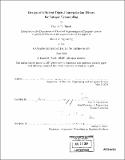Design of efficient digital interpolation filters for integer upsampling
Author(s)
Turek, Daniel B. (Daniel Bernard), 1980-
DownloadFull printable version (1.934Mb)
Other Contributors
Massachusetts Institute of Technology. Dept. of Electrical Engineering and Computer Science.
Advisor
Alan V. Oppenheim.
Terms of use
Metadata
Show full item recordAbstract
Digital signal interpolation systems can be implemented in a variety of ways. The most basic interpolation system for integer upsampling cascades an expander unit with an interpolation low-pass filter. More complex implementations can cascade multiple expander and low-pass filter pairs. There is also flexibility in the design of interpolation filters. This thesis explores how digital interpolation systems for integer upsampling can be efficiently implemented. Efficiency is measured in terms of the number of multiplications required for each output sample point. The following factors are studied for their effect on system efficiency: the decomposition of an interpolation system into multiple cascaded stages, the use of recursive and non-recursive interpolation filters, and the use of linear-phase and minimum-phase interpolation filters. In this thesis interpolation systems are designed to test these factors, and their computational costs are calculated. From this data, conclusions are drawn about efficient designs of interpolation systems for integer upsampling.
Description
Thesis (M. Eng.)--Massachusetts Institute of Technology, Dept. of Electrical Engineering and Computer Science, 2004. Includes bibliographical references (leaf 44).
Date issued
2004Department
Massachusetts Institute of Technology. Department of Electrical Engineering and Computer SciencePublisher
Massachusetts Institute of Technology
Keywords
Electrical Engineering and Computer Science.